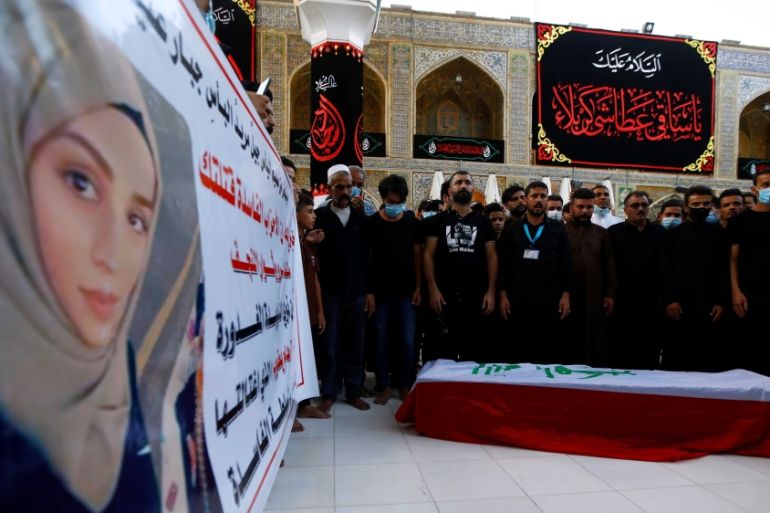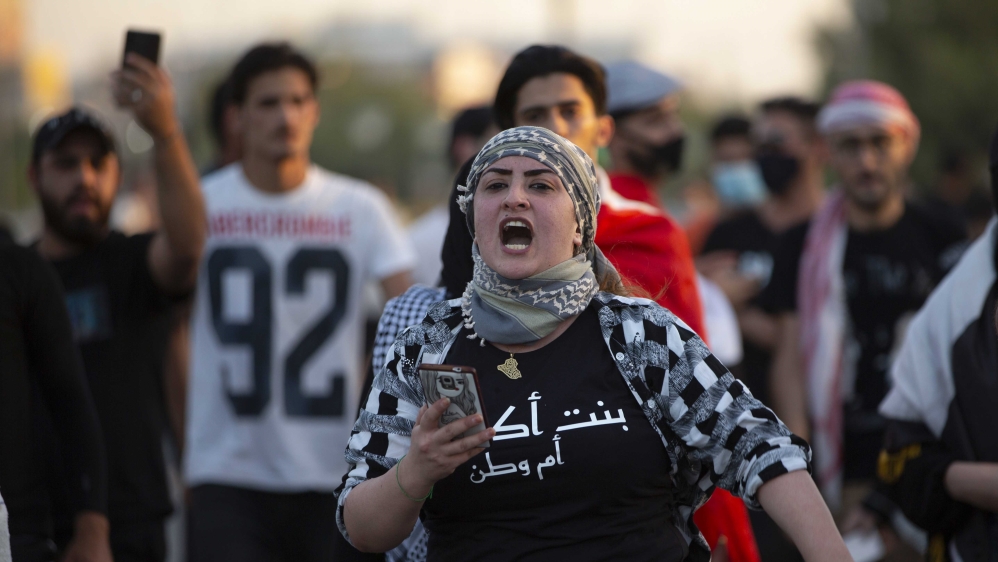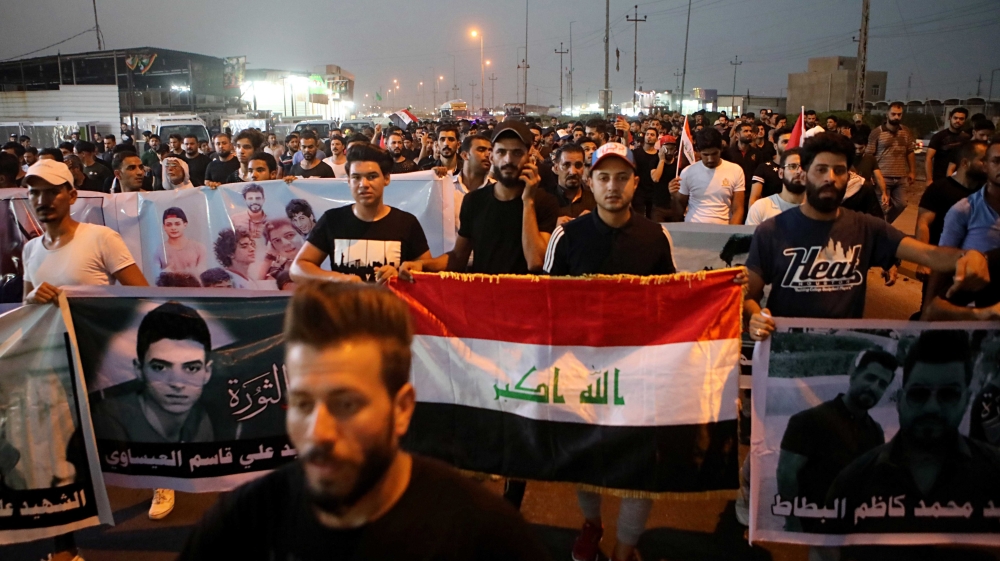What is behind the killings in Basra?
The recent violence aims to derail the Iraqi protest movement ahead of the 2021 elections, analysts and activists say.

On August 17, Iraqi activists Lodia Remon, Abbas Subhi and Fahd al-Zubaidi were heading to the mourning ceremony for fellow activist Tahseen Oussama, who was killed in the southern city of Basra three days earlier, when armed men attacked them. Remon was shot in the leg and Subhi in the chest.
“I survived by a miracle. I still cannot stand on my feet and until now I am in shock,” Remon told Al Jazeera. Subhi, who required surgery, also survived.
Two days later, Reham Yacoub, a close friend of Remon and a fellow activist, was shot dead in her car, sparking public anger and demonstrations in several Iraqi cities. The murder attempt and the death of close friends have taken a toll on Remon, who is a member of Basra’s small Christian community.
“I think that I have lost a large part of my dreams and my aspirations for the first time in my life. I feel I have lost my courage and fear has taken over. The psychological pain is so much worse than the physical pain,” she said.
Activists and protest organisers have been targeted this month in several other southern and central provinces, which have witnessed anti-government protests for more than a year. An estimated 700 protesters have been killed and dozens of activists and government critics murdered.
In Basra, where the Iraqi protest movement emerged, the killings have created an atmosphere of fear, with a number of activists fleeing the city in recent days. Locals have accused Iranian-backed armed groups of carrying out the attacks.
Activists and analysts Al Jazeera spoke to said the violence is aimed at preventing the protest movement from transforming into a political party, which could challenge the status quo in the 2021 parliamentary elections.

Birth of a movement
The first protest that Basra activist Mohanad al-Khafajy went to was in 2012, just a year after the so-called Arab Spring uprisings toppled longtime rulers in Tunisia and Egypt and sparked hope of a democratic transformation in the region.
The demands of the young people who took to the streets of the city were more modest: They wanted the constant electricity blackouts to stop.
Years of instability and mismanagement had left oil-rich Basra with dilapidated infrastructure that cannot provide proper public services to its two million residents. Severe shortages of water and electricity have made its hot and humid summers particularly unbearable.
After demonstrating throughout the summer of 2012, al-Khafajy and two dozen other young people decided to form a group to coordinate protest action.
The group eventually came to be known as the Civilian Youth of Basra. Its main demand was the establishment of a non-sectarian system of government based on justice and rule of law.
For al-Khafajy, the protests in Basra, which took place almost every year since 2012, as well as the political organising done by Civilian Youth of Basra and other groups and activists, laid the foundations of the 2019 movement for change in Iraq, which toppled the government of Adel Abdul Mahdi last November.
“The protest movement in Iraq started from Basra, where it developed a culture of protest and free expression which then spread to other provinces,” al-Khafajy told Al Jazeera.
In June 2019, amid scorching heat and a major water and electricity crises, thousands of people took to the streets in Basra again. After a short-lived lull at the end of the summer, in October, the protests reignited and spread across the southern and central provinces, as well as the capital, Baghdad. This was when Oussama became more active in the Civilian Youth of Basra, which he often hosted in the office of his internet company.
“After [the protest movement] threatened the interests of the corrupt and foreign-backed parties, it became a real danger that requires the use of brutal and violent methods to silence these voices,” said al-Khafajy.

Death threats
According to al-Khafajy, Oussama was killed because of his membership and activities with Civilian Youth of Basra, which the political forces governing Iraq have started to see as a threat because of its effective grassroots organising and protest activity. Other members, including al-Khafajy, were also threatened.
The group had intended to register a party and compete in the next election, but Oussama’s murder put those plans on hold. Al-Khafajy told Al Jazeera he has left Iraq again after he and his family were followed by unknown men.
This is not the first time Basra witnessed a string of assassinations of political activists. In 2018, when the city saw major protests against poor services, employment and corruption, several prominent figures were killed, including Jabbar Karam al-Bahadli, a human rights lawyer who defended detained demonstrators, and Suad al-Ali, a human rights activists who supported the protests.
The same year, Remon, Yacoub, and other female activists who were active in women’s groups and organised women’s marches, faced a smear campaign by pro-Iranian media outlets and social media accounts, accusing them of being part of an American plot to destabilise Basra. As a result, they started receiving threats to their lives.
“I received many death threats in 2018. In 2020, I was also threatened on social media and through phone calls because of my continued participation in the protests and civil work,” Remon told Al Jazeera.
On August 20, Prime Minister Mustafa al-Kadhimi visited Basra and met with Yacoub’s family. He pledged those responsible for the attacks and murders would be arrested and punished. He dismissed the security chiefs in the city and sent in reinforcements of security forces.
But according to Sarmad al-Taei, a Basra-based journalist, the measures taken by the government so far are unlikely to bring those responsible to justice.
“Al-Kadhimi continues to dismiss security chiefs and move around the Counterterrorism Forces, but this is not enough. He realises his power is limited and he has not yet undertaken any major action against the killers,” he told Al Jazeera.
Part of the reason for the lack of progress is because the government does not have full control of the security apparatus, which does not always carry out orders that come from Baghdad. Al-Taei said the government has repeatedly tried to release detained protesters, but is sometimes unable to because information on their whereabouts in certain prisons is purposefully withheld.
In his opinion, the escalation in violence is an attempt to put down the protest movement, which has grown in both power and legitimacy.
|
|
‘Shadow state’
Local activists, including al-Khafajy, said they believe pro-Iranian armed groups carried out the assassinations. These armed groups have also been accused of participating in violent crackdowns on protests in 2019 and 2020, alongside security forces.
According to Haider Saeed, head of the research department at the Arab Center for Research and Policy Studies, these fighters are part of what he calls a “shadow state”.
“These factions began as forces challenging the state, and during the [Iraqi Prime Minister Nouri] al-Maliki era, especially between 2012 and 2015 – a moment of weakness for the state – it resorted to them [to fight ISIL],” said Saeed. “Then an attempt was made to make them part of the state, that is, to give them an official cover. But in effect, they still work outside the will of the state.”
In the years after the US invasion in 2003, various Shia armed groups were formed in Iraq, some with a pro-Iranian agenda and others with a more nationalist slant. When the ISIL (ISIS) armed group took over large swaths of Iraqi territory in 2014, these groups, along with new armed groups created for the anti-ISIL war effort, were reorganised into an umbrella organisation called the Popular Mobilisation Units (PMU).
After the end of the battle against ISIL, some of the pro-Iranian armed groups formed a political alliance, which came second in the 2018 parliamentary elections in Iraq. Although formally the PMU is part of the Iraqi security forces, attempts to integrate it fully have not been successful.
During the 2019-2020 protests, its offices in multiple cities were attacked by protesters angry at armed fighters participating in the crackdown against them. Most recently, on August 22 in the southern city of Nasiriyah, demonstrators burned and tore down with a bulldozer the offices of pro-Iran groups and Shia parties after their sit-in in the city centre was attacked with a bomb.
According to Saeed, there are two reasons for the recent attacks on protesters and activists.
“First, the ‘shadow state’ and the state have entered a confrontation because [of actions by] al-Kadhimi’s government, so the assassinations are a challenge to the PM,” he said. “Second, with the government setting a date for early elections, it seems that these forces want to reduce the chances of the protest forces to organise and have a role in the vote.”
Currently, the protest movement is experiencing a lot of challenges, including the continuing attacks on its members and internal divisions, Saeed said. He sees the lull in demonstrating as an unannounced truce with al-Kadhimi in order to give him time to try to fulfil some of the protesters’ demands.
However, there are already calls for new demonstrations on October 1 to mark the movement’s first anniversary.
Both al-Khafajy and Remon said they believe while the protest movement has been weakened, it has not been defeated.
“My message to the Iraqi people is to stop being silent about injustice and corruption. Justice will triumph one day. A new generation is rising that cannot be silenced,” said Remon.
Follow Mariya Petkova on Twitter: @mkpetkova